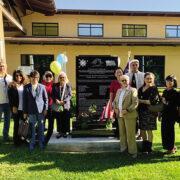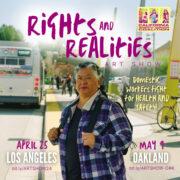Noong Agosto 12, 2019, ang USCIS ay nagpahayag ng final rule na nagbabago ng mga regulasyon ng Department of Homeland Security (DHS) tungkol sa public charge. Sa ilalim ng Immigration and Nationality Act (INA), ang isang dayuhan ay maaaring maging inadmissibile o di pahihintulutang pumasok ng US kung mayroong posibilidad na siya ay magiging public charge sa hinaharap na panahon. Ang final rule ay magiging epektibo sa Oktubre 15, 2019. Sa final rule, ang USCIS ay may awtoridad na pahintulutan na ang isang dayuhan ay mag-submit ng public charge bond sa kanyang pag-apply ng green card. Sa final rule, mayroon ding requirement na ang mga dayuhan na humihingi ng extension of stay o change of status sa USCIS ay hindi nakatangggap ng public benefits na mahigit sa itinalagang threshold.
Ayon sa USCIS, ang pagpapatupad ng public charge inadmissibility law ay magsusulong ng mga mithiin ng sariling kakayahan, pagsandig sa sarili, pagiging masipag at matiyaga, na silang mga naging pundasyon ng US. Ito rin ang mga inasahan ng ilang henerasyon ng masisipag na dayuhan na naghanap ng mga oportunidad sa US sa matagal at mahabang panahon. Ang final rule ay hindi nag-aapply sa mga US citizen (USC) kahit ang USC ay kamag-anak ng dayuhan na sumasailalim sa public charge ground ng inadmissibility. Ang mga isaaalang-alang ng DHS ay mga public benefits na direktang natanggap ng dayuhan para sa kanyang kapakanan, o kung saan naka-lista ang dayuhan bilang beneficiary ng public benefit. Ang public benefit na natanggap ng dayuhan para sa iba ay hindi rin kasama, kahit ang public benefits ay natanggap ng mga miyembro ng pamilya ng dayuhan.
Ang DHS ay nagbago na rin ng interpretasyon ng “public charge” at kasama na ngayon dito ang mga non-cash benefits tulad ng food stamps, Medicaid, at mga housing voucher o mga housing subsidy upang matiyak na ang mga dayuhang napapailalim sa public charge inadmissibility ground ay may sariling kakayahan at hindi umaasa sa public resources para sa kanilang mga pangangailangan. Subalit sila ay umaasa sa sariling kakayahan at sa mga mapagkukunan ng kanilang mga pamilya, o kaya ay sa sponsor at mga pribadong organisasyon para sa kanilang mga pangangailangan. Ang bagong depinisyon ng “public charge” sa final rule ay isang dayuhan na nakatanggap ng mga public benefit ng mahigit ng 12 buwan sa loob ng 36 buwan sa pangkalahatan. Kaya’t ang pagtanggap ng dalawang benefit sa isang buwan ay bibilangin bilang dalawang buwan. Sa final rule, kasama na sa “public benefit” ang mga cash benefits para sa income maintenance, Supplemental Security Income (SSI), Temporary Assistance to Needy Families (TANF), Supplemental Nutritional Assistance Program (SNAP) o mga food stamp, mga Medicaid, Section 8 Housing Assistance sa ilalim ng Housing Choice Voucher (HCV) Program, Section 8 Project-Based Rental Assistance, at iba pang subsidized housing.
* * *
On August 12, 2019, the USCIS announced a final rule amending Department of Homeland Security (DHS) Regulations by prescribing how DHS will determine whether an alien who is applying for admission or adjustment of status is inadmissible to the US under the Immigration and Nationality Act (INA) based on his likelihood of becoming a public charge at any time in the future. This final rule will take effect on October 15, 2019. Under the final rule, USCIS has the authority to permit an alien to submit a public charge bond in the context of adjustment of status applications. The rule also includes a requirement that aliens seeking an extension of stay or change of status demonstrate that they have not, since obtaining the nonimmigrant status they seek to extend or change, received public benefits over the designated threshold.
According to the USCIS, the enforcement of the public charge inadmissibility law will promote the ideals of self-sufficiency, self-reliance, industriousness and perseverance, which have laid the foundation of the nation and have defined generations of hardworking immigrants seeking opportunity in the US ever since. The rule does not apply to US citizens (USC), even if the USC is related to an alien subject to the public charge ground of inadmissibility. DHS will also consider only public benefits received directly by the alien for the alien’s own benefit, or where the alien is listed as the beneficiary of the public benefit. Benefits received on behalf of another will not be considered. Neither will receipt of public benefits by one or more members of the alien’s household be attributed to the alien, unless the alien is also listed as a beneficiary of the public benefit.
DHS is revising its interpretation of “public charge” to incorporate consideration of non-cash benefits such as food stamps, Medicaid, and housing vouchers or other housing subsidies to better ensure that aliens subject to the public charge inadmissibility ground are self-sufficient and do not depend on public resources to meet their needs. Rather, they rely on their own capabilities, as well as the resources of family members, sponsors and private organizations. The rules redefines “public charge” as an alien who receives one or more designated public benefits for more than 12 months, in the aggregate, within any 36-month period (such that, for instance, receipt of 2 benefits in 1 month counts as 2 months). The rule further defines the term “public benefit” to include any cash benefits for income maintenance, Supplemental Security Income (SSI), Temporary Assistance to Needy Families (TANF), Supplemental Nutritional Assistance Program (SNAP) or food stamps, most forms of Medicaid, Section 8 Housing Assistance under the Housing Choice Voucher (HCV) Program, Section 8 Project-Based Rental Assistance, and certain other forms of subsidized housing.
* * *
ATTY. RHEA SAMSON is a Partner at LINDAIN & SAMSON LAW FIRM. Atty. Lindain and Atty. Samson are both licensed to practice law in California and in the Philippines. Both Attorneys were also professors. LINDAIN & SAMSON LAW FIRM aims to provide excellent and efficient legal representation to clients, and support clients in achieving their goals and dreams. As professors, Atty. Lindain and Atty. Samson wish to educate the younger generation, as it is through education and continuous study that one can achieve success and serve others.
Please visit our office: LINDAIN & SAMSON LAW FIRM
3580 Wilshire Boulevard, Suite 1710, Los Angeles, CA 90010
Call or text us: (213) 381.5710
Email us: [email protected].




